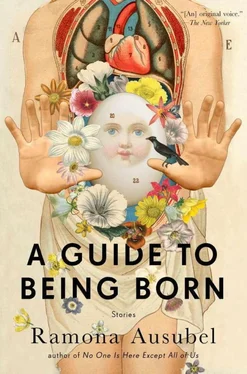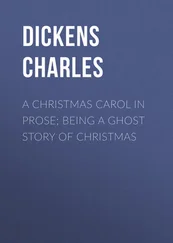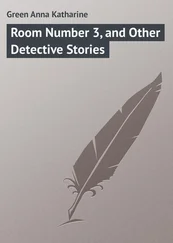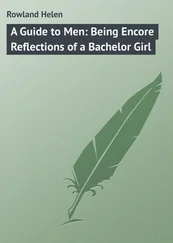• • •
IT IS A WARM NIGHT and though the rest of the grandmothers go inside to their claimed cabins, Alice lies down on deck. She covers herself with her blanket. “I think tomorrow is Wednesday,” she says to herself. “The garbage goes out on Wednesday.” She can hear the sound of the truck, green and screeching as it devours up the trash and smashes it down. “It’s the day I teach poetry, in my apartment.” The day that she will not attend is laid out before her, the newspaper that she will not read lands at her doorstep. The phone, the refrigerator, the cat. She holds her own hands.
In a hospital room, four grown children surround their mother. Nervous, one eats a bag of chips. Another opens a book of poems, searches for the exact right words. The nurses prepare swabs, towels. Grandchildren collect around the bedside. It is not dark in the room but it is not light either, and even the city outside whispers. There are sailboats slipping along the surface of the lake. They tack around red buoys. The sailors’ voices cannot be heard this high, this far away—the whole world between them—still their boats are part of this big view. When a telephone in the corner rings, the only son chats with two of his mother’s oldest friends before he says, “They’re going to take the tubes out of her lungs. Any minute.” One daughter rubs her mother’s hands with lotion. “It’s in and out, just like this,” she says, breathing to show breathing. “Go as long as you want. It can be two minutes and it can be ten years.”
When the son hangs up the phone, he asks his mother, “Do you have any idea how many people adore you?” And this woman, this mother and grandmother, smiles wide enough that her teeth, treasures in that cave, shine.
• • •
THE BOAT IS ROCKING, the sea stretching around her.
“Do you think this is it?” Alice asks, but there is no answer. “There are people I was hoping to see again!” she calls out to the dark. Her knees are tucked together, legs folded like wings. Below, so much water moves restlessly. Above, the air does the same.
The gulls still circle even though it is too dark to hunt. “Do you know,” Alice yells to the birds above, “that I have not been swimming in ages? How do you not swim in such a great big ocean?” Soon she is tying great knots along the enormous rope, every foot and a half. The knots are the size of her head. It gets harder and harder the farther she gets from the end. Her palms are sore. Each knot she ties, she tries to remember a person she loves. She gets the name and the face in her mind. The Jewish boy she wasn’t allowed to see; her cousin, whom she always got in trouble with as a girl; her brother, whom she loved better than others did; her mother, who ended it all when she thought things were starting to get unsightly. Her two husbands, whose necks she could still smell, who had left her, one and then the next, alone on the turning earth. She thinks to herself, Now I can say that I love them all. I am an old woman and no one will try to dissuade me. All the single fibers, twisted together into ten, the ten into a hundred, the hundred into a thousand.
She takes her dress off and makes the trip in her white slip. She can feel the wind moving through her loose cotton underwear, but it is the slip that really dances. It puffs up and looks, at moments, like a wedding gown, then pastes itself to her body, every shape underneath mimicked by the fabric. The separation of the legs is defined along with the cut of the waist. The rope swings gently, and the clinging lady with it.
“I don’t know if I can make it!” Alice calls up to the gulls. She is more than halfway down. Again, as her feet move to a new knot, she remembers a person she loves.
Her feet slide to the next knot and hands follow.
Alice reaches the water. When she touches down, the water stings. “It’s cold,” she relays to the dry air. But she wants to let go of the rope. She wants to be free of the climb, so she lets herself fall in, her entire weight let loose in the water. It catches her easily and she dunks her head under. She laughs the laugh of a cold, floating person. She waves her arms and lets the yips come out of her mouth. She peers below, trying to see, but the only things are her own feet haloed by green phosphorescence, kicking and kicking and kicking.
“Will both of my husbands be mine again?” she calls to the birds or the fish or the sky. “Can I love them again now?” She does not get her answer. Her slip rises up around her like a tutu. She looks now like a ballerina on a music box, legs bared under the high-flying skirt. The material is soft and brushes Alice’s arms. She does not try to hold the slip down. Her breasts float up. All around her the green light of stirred water.
The boat groans and leans away, then begins to slip across the smooth sea. Alice does not feel herself moving and the ship leaves no wake, yet there is much morning-bright water between them. Her rope slaps at the hull, quieter as it goes, until all she hears is the echo of a sound no longer taking place, just her ear’s memory of that song. The ocean is full and the sky is full—how plentiful the elements are! Alice floats on her back at the exact point of their meeting, held like a prayer between two hands pressed together.
She dives under and spins, making a lopsided flip, and emerges with her hair stuck to her face. Drops fall from her chin in a glowing chain. They fall from her hair and from her ears and from the tip of her nose. They fall from eyelashes and from the lobes of her ears. The drops join back up with the whole ocean and disappear inside that enormous body. Alice throws her arms up in ta-da position, water flying off in a great celebration of sparks.
LAURA AND I CELEBRATED my new job for the sake of having something to celebrate. I picked up a mushroom pizza and a six-pack of Diet Cokes, and Laura and I sat on a picnic blanket in the middle of our suburban front yard. Poppy sat there too, only she was in her stroller bed as always. The grass was craning out of the dirt and the birds were going for all our scraps. We lay on our backs like Poppy does, flat down, and looked at the graying blue of the sky. It came at us. Storming us with its color, with its light.
That afternoon, when I accepted the job as the head guide of the ghost tour on the retired ocean liner, the boss told me I could write my own content for the tour. Mr. Peterson said, “We love that you are creative. We think that’s so cool!”
I shook his hand and then I sat in the car and let go of a few tears. I had to. It was the first time anyone was paying me to write something and it was the worst kind of writing. Shameful, jokey, forgettable.
“Thank you for taking this job,” Laura said, without turning to look at me. “I know you don’t want it.”
“I don’t not want it. I want to do whatever I need to do.”
“Do you want to ever try again?” she asked, looking at her middle.
“We can’t afford it.”
“My mother would keep helping with money.”
“That’s not what I mean.”
When the sun dropped behind the trees, their shadows got long and greedy. We went inside and threw away the rest of our dinner, kissed our mute and immobile kin good-night. Our stunted eight-year-old. She didn’t meet our eyes, but she did make some noises; she did hold our fingers in each of her fists, Laura’s in her right and mine in her left.
We stood there in a chain like that until she let go and released us.
Dear Poppy,
I had to tell your father about the pubic hairs. I tried to call him at work, but I didn’t get him—I couldn’t put the news on his voice mail. I waited until he was home and we had eaten our dinner and I asked him, “How was work, honey?”
Читать дальше












